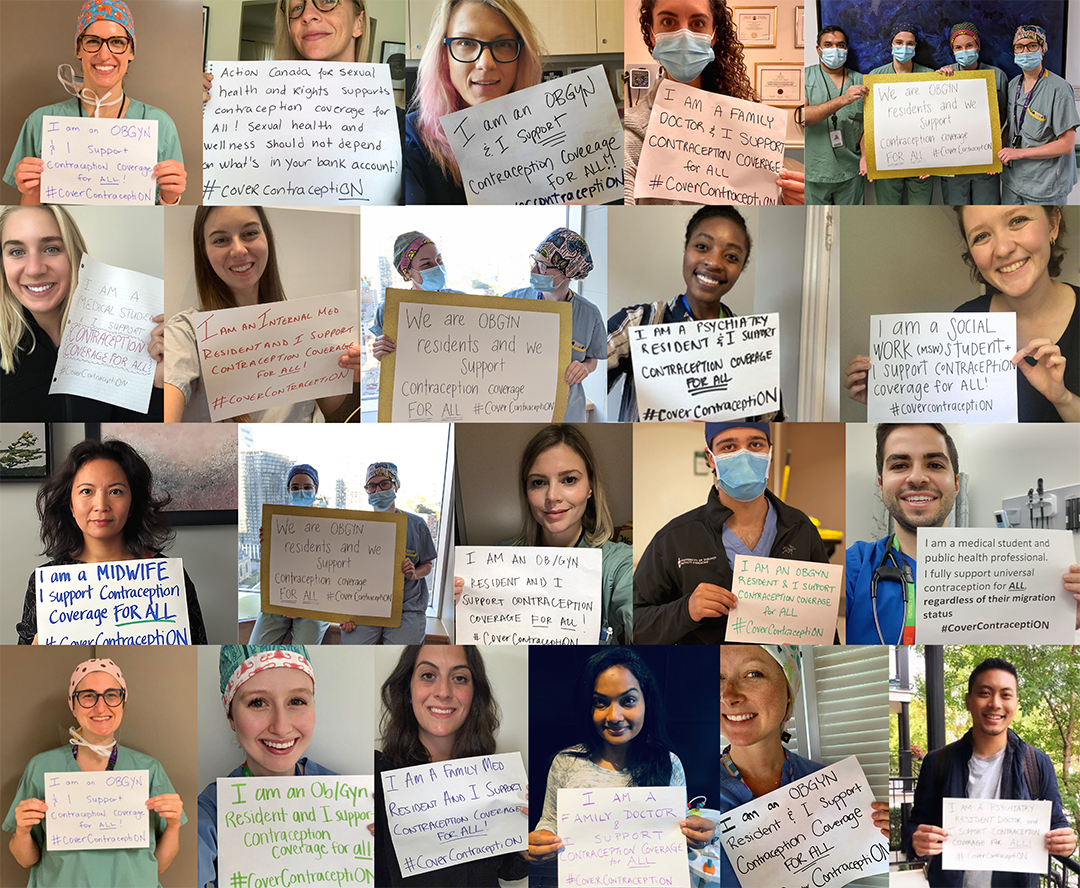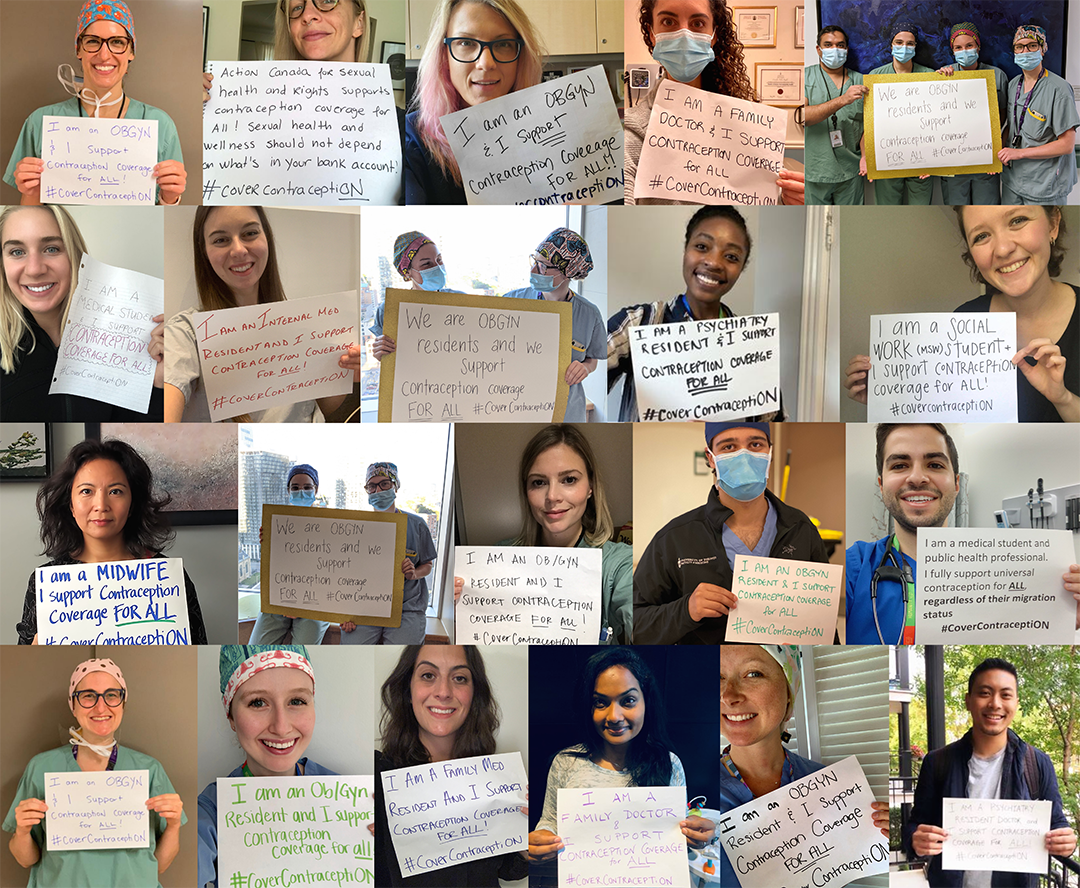Mobile Menu
- Education
- Faculty
- Research
- News & Events
- Divisions
- Equity, Diversity & Inclusion
- About Us

 Written by: Dr. Sarah Freeman (PGY1) and Dr. Nour Bakhache (PGY1)
Written by: Dr. Sarah Freeman (PGY1) and Dr. Nour Bakhache (PGY1)
In honour of World Contraception Day on September 26, 2020, a team of healthcare workers, led by UofT Obstetrics and Gynaecology faculty and residents, launched CoverContraceptiON, a campaign to implement no-cost contraception coverage for all Ontarians.
As healthcare providers, we are aware that the COVID-19 pandemic has increased barriers to contraception for our community’s most structurally vulnerable patients. Cost is the number one barrier to contraception access in Canada, and the current global economic recession further threatens individuals’ ability to access these essential medications (1,2). Furthermore, pandemic-related lockdowns have endangered patients and limited their bodily freedoms, as evidenced by the global rise in intimate partner violence (3). Now more than ever, it is incumbent upon healthcare providers to stand up for the reproductive rights of their patients and, by extension, the health of their communities.
The Canadian Medical Association, Society of Obstetricians and Gynaecologists of Canada, and the Canadian Paediatric Society have all endorsed the provision of no-cost contraception for all (4-6). In fact, unlike the United Kingdom and Denmark, Canada is one of the few countries with universal healthcare that fails to provide this type of coverage. When such policies have been implemented in other regions, benefits include lower rates of unintended pregnancies and induced abortions (7). While a national policy would increase public spending by an estimated $157 million annually, it would proceed to save the government an estimated $320 million per year in direct medical costs related to unintended pregnancy (5,8). Taking into consideration current evidence, universal contraception coverage proves to be an effective means for improving reproductive health and increasing health equity while easing the burden of healthcare spending.
This week, the CoverContraceptiON team published an open letter from healthcare providers calling for the Ontario Provincial Government to implement universal, no-cost coverage for all contraceptive options without delay. Since then, over 600 Ontario healthcare providers and health professions students have signed the letter to voice their support of this demand.
We encourage you to read our open letter and consider adding your signature.
We are also encouraging healthcare workers to help support our campaign with any of the following actions:
We are hopeful that with our collective advocacy on this important issue, we can improve the reproductive health of our community.
We would like to thank the following members of the CoverContraceptiON team for their dedication to our campaign:
Contact:
References:
(1) Hulme, Jennifer, et al. “Barriers and Facilitators to Family Planning Access in Canada.” Healthcare Policy | Politiques De Santé, vol. 10, no. 3, 2015, pp. 48–63., doi:10.12927/hcpol.2015.24169.
(2) Black, Amanda Y., et al. “The Cost of Unintended Pregnancies in Canada: Estimating Direct Cost, Role of Imperfect Adherence, and the Potential Impact of Increased Use of Long-Acting Reversible Contraceptives.” Journal of Obstetrics and Gynaecology Canada, vol. 37, no. 12, 2015, pp. 1086–1097., doi:10.1016/s1701-2163(16)30074-3.
(3) Taub, Amanda. “A New Covid-19 Crisis: Domestic Abuse Rises Worldwide.” The New York Times, The New York Times, 6 Apr. 2020, www.nytimes.com/2020/04/06/world/coronavirus-domestic-violence.html (Accessed September 30, 2020).
(4) CBC News. Canadian Doctors Want Ottawa to Pay for Birth Control. August 16, 2012: https://www.cbc.ca/news/canada/north/canadian-doctors-want-ottawa-topay-for-birth-control-1.1295913 (Accessed September 30, 2020).
(5) Black A, Guilbert E, Costescu D, et al.; Co-Authors; Special Contributors; Society of Obstetricians and Gynaecologists of Canada. Canadian contraception consensus (part 1 of 4). J Obstet Gynaecol Can 2015;37(10):936–42.
(6) Di Meglio G, Yorke E. Universal access to no-cost contraception for youth in Canada. Paediatrics & Child Health. 2019;24(3):160-164.
(7) McNicholas C, Madden T, Secura G, Peipert JF. The contraceptive CHOICE project round up: what we did and what we learned. Clin Obstet Gynecol. 2014;57(4):635-43.
(8) Morgan SG, Law M, Daw JR, Abraham L, Martin D. Estimated cost of universal public coverage of prescription drugs in Canada. CMAJ 2015;187(7):491–7.
_____________________________________________________________
Don't want to miss a post? Follow us on social media for more news!
FACEBOOK | INSTAGRAM | TWITTER
If you would like to be a guest blogger, please contact us at obgyn@utoronto.ca.
